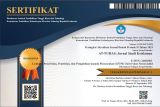Criminal Liability of Children from the Perspective of Islamic Law and Positive Law in Indonesia
(1) Akhmad Sukris Sarmadi (UIN Antasari, Banjarmasin)
Indonesia
(2) * Arne Huzaimah
 (UIN Raden Fatah, Palembang)
(UIN Raden Fatah, Palembang) Indonesia
(3) Jalaluddin Jalaluddin (UIN Antasari, Banjarmasin)
Indonesia
(4) Lahmudinur Lahmudinur (STAI Darul Ulum, Kandangan)
Indonesia
(5) Agus Bambang Nugraha (Universitas Kristen Satya Wacana, Salatiga)
Indonesia
(6) Karimuddin Abdullah Lawang (IAI Al-Aziziyah Samalanga Bireuen, Aceh)
Indonesia
(*) Corresponding Author
AbstractThe position of children as legal subjects will certainly become a problem that needs to be studied in more depth. Children who physically and psychologically still need care and guidance in order to achieve perfect growth, precisely when dealing with the law will certainly experience psychological and even physical changes in a bad direction. In the case of children as legal subjects, there is a difference between Islamic law and positive law in Indonesia because of the different objectives of establishing and enforcing the law itself. To examine this problem, qualitative research methods are used with a normative juridical approach. The data collection technique was carried out using the documentation method, in which data was collected from fiqh literature and laws related to juvenile crimes, then analyzed using the content analysis method. The results of the study show that children according to Islamic law are not subject to criminal punishment because punishment in Islam is imposed on people who are mature (adults), have good sense and criminal acts are not carried out by force. However, in Islam if a child performs jarimah, a ta'zir punishment will be imposed as guidance and teaching for the child. Meanwhile, according to positive laws in Indonesia, the punishment system is different from adults.
|
Keywords
Criminal Liability; Juvenile Crime; Islamic Law; Positive Law
Full Text: PDF
Refbacks
- There are currently no refbacks.
Copyright (c) 2023 Akhmad Sukris Sarmadi, Arne Huzaimah, Jalaluddin Jalaluddin, Lahmudinur Lahmudinur, Agus Bambang Nugraha, Karimuddin Abdullah Lawang
This journal is licensed under a
Creative Commons Attribution-ShareAlike 4.0 International License





.png)






